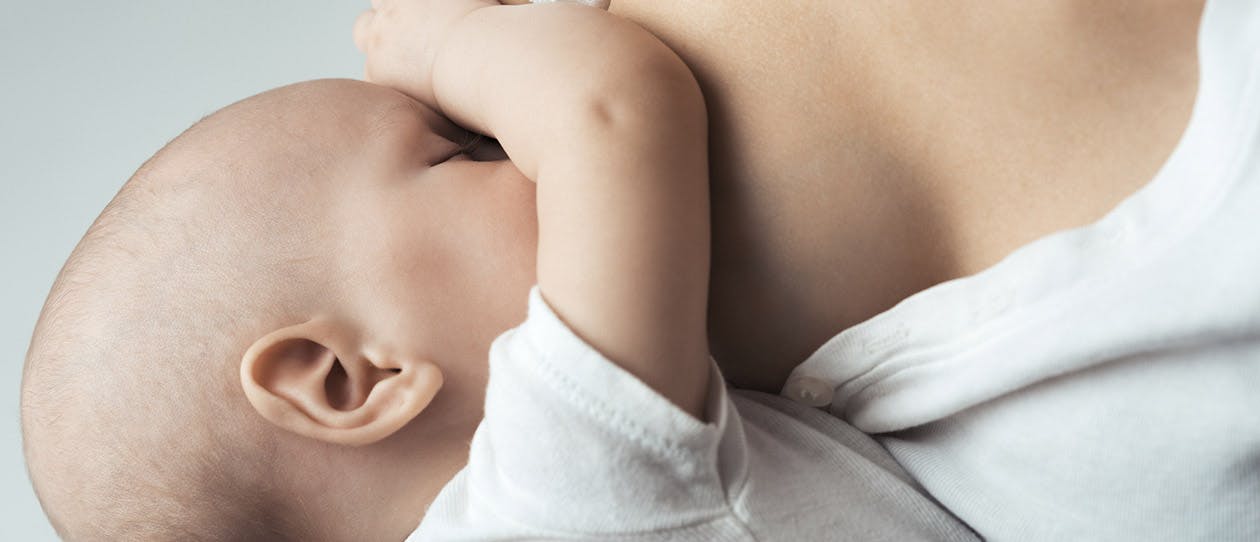
- Health hub/
- Resources for Pregnancy and Preconception/
- Breast-feeding: Breast is best


The National Health and Medical Research Council recommends that babies be exclusively breast-fed for six months, with the introduction of complementary foods and continued breast-feeding thereafter.
Close mother-child contact immediately after birth helps to establish milk flow, and frequent feeding on demand helps to maintain it. Stress such as pain or anxiety can inhibit milk production, but breast-feeding can itself reduce response to stress. For many women, the special connection created through nursing is one of the greatest joys of motherhood.
Breast milk: The perfect food for your baby
Breast milk provides all the nutrients your baby will need for the first six months of life. It is a living substance that cannot be duplicated by infant formulas and is especially important for pre-term or low-birth weight infants. It provides essential fatty acids (such as DHA), vitamins and minerals, as well as important enzymes and immune factors needed for your baby’s short-term and long-term health. It is also convenient, sterile and economical. Health benefits for breast-feeding infants include:
- reduced risk of diarrhoeal illnesses
- reduced risk of respiratory and other infections
- reduced risk of middle ear infection (otitis media)
- reduced risk of some allergies
- possible reduced risk of childhood obesity
- improved mental, visual and psychomotor development
- good jaw development
- psychological benefits
Health benefits for breast-feeding mothers include:
- faster recovery from childbirth with reduced risk of abnormal blood loss
- reduced fertility during lactation (but you should still continue to use birth control if you don’t want to fall pregnant during this time)
- possible accelerated weight loss and return to pre-pregnancy body weight
- possible reduced risk of osteoporosis
- psychological benefits
If you are taking any medications, each drug should be specifically checked with your healthcare professional for contraindications to breast-feeding.
Nutrition and breast-feeding
The daily nutrient requirements of a breast-feeding mother are even greater than during pregnancy. Additional kilojoules are required to produce energy and the 1.5 litres of milk that may be formed each day. The Australian Guide to Healthy Eating advises an additional daily intake of three servings of fruit and two of vegetables during lactation to provide the extra vitamins and other nutrients you will need. An extra 12 to 15 grams of protein is also needed daily. Consume 2 litres of water per day to ensure adequate milk production (pay special attention to calcium needs to decrease the risk of calcium loss from your bones). Maintain healthy eating habits as recommended for pregnancy to ensure optimal nutrition.
Breast-feeding tips
Newborns need to nurse at least 10 to 12 times a day, or every 2 to 3 hours around the clock, for at least the first month of life to receive adequate nutrition. Encouraging unlimited frequent breast-feeding increases milk production, leading to greater infant weight gain, decreased nipple and breast problems, and longer duration of breast-feeding. Regular nursing also helps avoid engorgement of the breasts.
- Avoid giving your baby sugar water or formula supplements, and delay using a dummy for at least a week or two after birth
- Proper positioning is important — the baby’s mouth should be wide open, with the nipple as far back into his or her mouth as possible; sore nipples are usually due to poor positioning
- Air dry your nipples after each nursing to avoid cracking of the skin
- Watch for infection (which can cause fever, painful lumps and redness) if symptoms develop see your healthcare professional immediately
- Engorgement — a new mother’s breasts can sometimes be big, hard and uncomfortable for a few days after birth; feeding the baby frequently and on demand will help, as may warm compresses and warm baths, and manually expressing milk during a warm shower; massaging breasts with avocado oil to relieve painful milk lumps; wear a comfortable nursing bra for support
- Eat right, get plenty of fluids and rest (take naps and sleep when the baby sleeps).
- Avoid foods which irritate the baby. Caffeine, chocolate and cow’s milk may contribute to colic.
Nipple problems
Tenderness is common when breast-feeding begins, but it usually passes once the milk is flowing and the baby has settled into feeding. However, sore or cracked nipples, engorgement and mastitis (infection of the breast) sometimes occur. It is important to see a lactation consultant and receive correct instruction in breast-feeding techniques that suit you. It is best to air dry nipples and apply your own breast milk to them, as it contains natural oils and antibodies to fight infection and promote healing. The use of soaps, creams and ointments should be avoided.
Dieting after childbirth
Despite what you may see in celebrity magazines, rapid weight loss is not advisable for breast-feeding women. Restricting your food intake, particularly during the first few weeks after delivery when milk production is being established, may compromise the quality and volume of milk, particularly in women who are already lean. Avoid liquid diets and weight loss medications.




